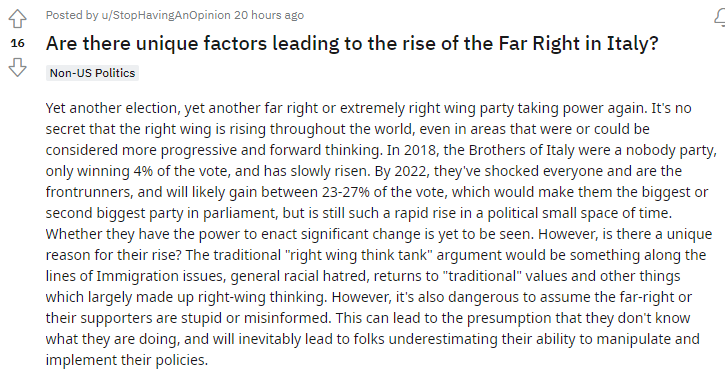
Mainstream political commentators, most of them wingcucks, are having extreme difficulty understanding the global politics of 2022. The common reaction to the recent electoral success of the Sweden Democrats and the Brothers of Italy is to shriek about far-right-wing extremism. But this is not an accurate way of understanding the phenomena at play.
The truth is that anyone still thinking in terms of left vs. right has a grossly flawed understanding of the political landscape. The relevant political axis in 2022 is globalist vs. nationalist. Only those who think in terms of globalist vs. nationalist can understand the patterns shifting through the mass political consciousness right now.
The only reason why anti-immigration sentiments are considered “far-right” is because Communists were on the winning side of World War II, and assumed control of the Western media shortly afterwards. Because they won, their enemies had to be dismissed as extremists, and because they were left, their enemies had to be dismissed as right. As such, nationalism became incorrectly conflated with the far-right.
This is why, in recent years, we’ve been spun a narrative of the pro-immigration left and the anti-immigration right.
In reality, the right is more than happy to support the mass immigration of cheap labour. Incoming British Prime Minister, Conservative Leader Liz Truss, has promised to open the immigration floodgates, with today’s “Conservative” logic apparently reduced to a simple equation: migration = growth.
So if the conservative right wing is in favour of the mass immigration of cheap labour, on account of that it pushes rents up and wages down and thereby makes the rich richer and the poor poorer, then the left wing must be against the mass immigration of cheap labour. Right?
Wrong. Apparently the left wing is also in favour of the mass immigration of cheap labour, as is the far-left. And so, by some twisted logic, opposing the mass immigration of cheap labour is far-right.
Moreover, the globalist religious elements of the right wing also want mass Third World immigration. For many Christian fundamentalists, borders and national sentiments are an impediment to God’s command that all are one in Rabbi Yeshua. To that end, they’re happy to import as many non-whites as possible, reasoning that the blending of the nations will hasten Rabbi Yeshua’s return.

If far-right corporate interests want mass Third World immigration, and if far-right religious interests want mass Third World immigration, then it does not make any sense to say that opposing mass Third World immigration is a far-right position. If far-right nationalist interests oppose it, then the relevant aspect is the nationalist one.
When it comes to immigration and labour rights, it’s time to forget left vs. right. Adherence to neither left nor right has much predictive value in this matter. The only logical approach to such questions is to think in terms of nationalist vs. globalist.
The nationalist approach to immigration is that it must serve the interests of the nation. This is not inherently an anti-immigration attitude. It means that immigration from low-IQ countries must be forbidden. Those immigrants tend to produce low-IQ offspring who cannot meet the cognitive demands of Western societies, and who end up becoming net drains on their host societies.
A reasonable nationalist would not necessarily disagree with immigration from high-IQ countries, unless it was of sufficient volume to disrupt social cohesion. Most nationalists make a clear distinction between ‘compatible’ and ‘incompatible’ cultures when it comes to immigration, but one thing is always agreed upon – immigration of low-IQ people from incompatible cultures has to stop.
The globalist approach to immigration, by contrast, is the more the merrier. Every extra labour unit pushes up house prices by increasing demand for housing, and pushes down wages by increasing the supply of labour. In other words: the more immigration, the more the rich get richer and the more the poor get poorer.
Globalist logic is that it doesn’t matter if the native working classes earn enough money to own homes and raise families. The most important thing is the profits of the international banking and finance interests, and these profits are maximised by maximum immigration. Any disruption this might cause to the ordinary lives of working-class people is not considered important.
This globalist arrogance has led to nationalist sentiments, not right-wing sentiments, rising all around the Western World.
It’s important to note that the globalist far-right is not rising much, if at all. The ACT Party is doing reasonably well in New Zealand, polling at about 10%. But this has less to do with the rise of the far-right and more to do with the lack of confidence in the mainstream conservative National Party.
Few of the young men who are flooding into the alternative right (to which ACT belongs) are agitating for more cheap labour or greater corporate control, much less for medieval-style theocracy. As such, their sentiments are best understood as the masculine expression of a nationalist mentality. That masculinity is associated with the right is secondary; nationalist interests are primary.
The electoral success of Giorgia Meloni’s party demonstrates that a feminine expression of nationalism is now rising to join the masculine expression. With both masculine and feminine aspects of nationalism rising, the return of nationalism to the main stage is inevitable. Understanding today’s political reality requires that one think in terms appropriate to these developments. The future is nationalist vs. globalist.
*
If you enjoyed reading this essay/article, you can get a compilation of the Best VJMP Essays and Articles from 2021 from Amazon for Kindle or Amazon for CreateSpace (for international readers), or TradeMe (for Kiwis). Compilations of the Best VJMP Essays and Articles of 2020, the Best VJMP Essays and Articles of 2019, the Best VJMP Essays and Articles of 2018 and the Best VJMP Essays and Articles of 2017 are also available.
*
If you would like to support our work in other ways, subscribe to our SubscribeStar fund, or make a donation to our Paypal! Even better, buy any one of our books!
